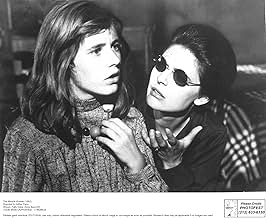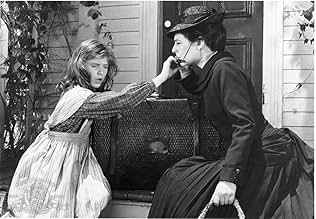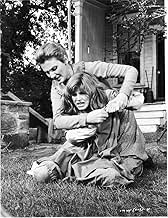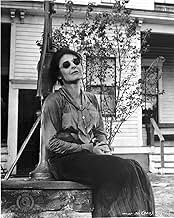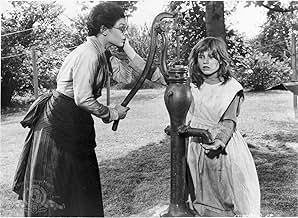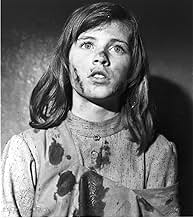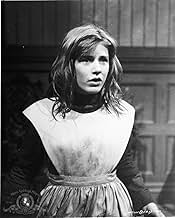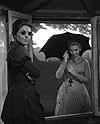IMDb-BEWERTUNG
8,1/10
21.678
IHRE BEWERTUNG
Die Geschichte von Anne Sullivans Kampf, der blinden und gehörlosen Helen Keller das Kommunizieren beizubringen.Die Geschichte von Anne Sullivans Kampf, der blinden und gehörlosen Helen Keller das Kommunizieren beizubringen.Die Geschichte von Anne Sullivans Kampf, der blinden und gehörlosen Helen Keller das Kommunizieren beizubringen.
- 2 Oscars gewonnen
- 13 Gewinne & 13 Nominierungen insgesamt
Maribel Ayuso
- Undetermined Role
- (Nicht genannt)
Dale Ellen Bethea
- Martha at Age 10
- (Nicht genannt)
John Bliss
- Admissions Officer
- (Nicht genannt)
Grant Code
- Doctor
- (Nicht genannt)
Michael Darden
- Percy at Age 10
- (Nicht genannt)
Michele Farr
- Annie at Age 10
- (Nicht genannt)
William F. Haddock
- 2nd Crone
- (Nicht genannt)
Jack Hollander
- Mr. Anagnos of Perkins School in Boston
- (Nicht genannt)
Alan Howard
- Jimmie at Age 8
- (Nicht genannt)
Judith Lowry
- 1st Crone
- (Nicht genannt)
Helen Ludlam
- 3rd Crone
- (Nicht genannt)
Beah Richards
- Viney - Keller Maid
- (Nicht genannt)
Empfohlene Bewertungen
Arthur Penn's superb, emotionally devastating screen version of William Gibson's play about the early life of Helen Keller and of how a great dedicated teacher, Annie Sullivan, dragged her kicking, if not necessarily screaming, out of her world of darkness. Penn's style is spare and unsensational, (even finding a good deal of humour in the early encounters between teacher and pupil; deaf, dumb and blind Keller may be but she is as wily as a cat and runs rings round Sullivan). The black and white images are straightforward and uncluttered and have the power of the images in silent cinema. As Sullivan and Keller, Anne Bancroft and Patty Duke are both astonishing. There is a rapport between these two actresses that seems to transcend mere 'acting' and raises the film to an altogether higher, more deeply moving plain.
I don't think I've seen a movie with such amazing performances in a LONG time! The more work I see of Anne Bancroft, the more I'm impressed with her craft. I've never seen Patty Duke in anything before, so needless to say, I was blown away by her performance as well.
The most intense acting is done without any dialogue, especially where Anne Sullivan insists that Helen learn how to eat properly.
Such incredible performances (very Oscarly deserved!) and even more incredible story to boot!
The most intense acting is done without any dialogue, especially where Anne Sullivan insists that Helen learn how to eat properly.
Such incredible performances (very Oscarly deserved!) and even more incredible story to boot!
Powerfully directed by Arthur Penn and supported by two Oscar-winning performances, The Miracle Worker dramatizes the early years of Helen Keller, the blind and deaf mute who became a famous author and prominent Socialist. Anne Bancroft's first lead role is as Anne Sullivan, Helen's lifelong teacher and friend and her performance is compelling. Patty Duke is also outstanding as Helen, portraying the disturbed child as she works to overcome bad manners and temper tantrums, the result of being overly indulged by her well meaning but ineffective parents. Moving into a small cottage away from her parents, Anne, who was partially blind herself, assists Helen with some tough love and begins to teach her to spell with her fingers.
Until this point, Helen had no understanding of the meaning of words. This changed when Anne led her to the water pump and spelled out the word water as she pumped the water over Helen's hand. She is said to have learned thirty words the same day and eventually learned to read. In 1904 Helen graduated from Radcliffe College, becoming the first deaf-blind person to earn a Bachelor of Arts degree. The film could have easily descended into melodrama, but Penn keeps his focus and the result is enormously moving without being maudlin. The Miracle Worker is a miracle.
Until this point, Helen had no understanding of the meaning of words. This changed when Anne led her to the water pump and spelled out the word water as she pumped the water over Helen's hand. She is said to have learned thirty words the same day and eventually learned to read. In 1904 Helen graduated from Radcliffe College, becoming the first deaf-blind person to earn a Bachelor of Arts degree. The film could have easily descended into melodrama, but Penn keeps his focus and the result is enormously moving without being maudlin. The Miracle Worker is a miracle.
With two terrific leading performances, an absorbing and thought-provoking story, and many well-conceived touches by Arthur Penn and his production team, this classic version of "The Miracle Worker" is an exceptional movie that appeals to the imagination and that has much to say about humanity. The story itself is so good that even the lesser remakes have been worth seeing, but there is really no reason at all to look any further than this nearly flawless filming of the story.
As Annie Sullivan and Helen Keller, Anne Bancroft and Patty Duke could not have been better. The battle of wills and wits between the two is engrossing, becoming quite involved and very interesting. The lengthy dining room struggle alone would make any movie worth watching - it is worthwhile even beyond the interesting action itself, as it brings out aspects of human nature and human learning that go beyond even Helen's own trials.
There is a great deal of substance to the movie that goes beyond the immediate issues and confrontations, and a significant reason for the greatness of the film is the way that Bancroft and Duke tap into the imagination of the viewer. The concept of seeing an unseen world (and the challenge of helping someone to see it) is brought out in ways that are profound yet accessible.
The two leads carry almost the whole picture, as the other characters are there primarily for Annie and Helen to play off of. Accordingly, the supporting cast keep their characters more simple, and their performances stylized and almost exaggerated, which allows Bancroft and Duke to have most of the moments of significance. The production also enhances the picture through simple but well-conceived settings, use of lighting, and other features that nicely complement the main action.
It's always rather unfortunate that movies like this one, which take a little effort to appreciate fully, are not given more attention. If you stop to consider what Helen Keller had to face in life, it is a situation far more terrifying than facing any of the cartoonish, artificial movie villains that gain so much notoriety. And if you consider the job that Annie Sullivan had to do, her accomplishment is far more impressive and worthwhile than almost any scientific discovery, feat of athletics, or military exploit.
That this movie is able to convey such themes makes it a memorable classic that is much more worthwhile than many movies that have received far more acclaim.
As Annie Sullivan and Helen Keller, Anne Bancroft and Patty Duke could not have been better. The battle of wills and wits between the two is engrossing, becoming quite involved and very interesting. The lengthy dining room struggle alone would make any movie worth watching - it is worthwhile even beyond the interesting action itself, as it brings out aspects of human nature and human learning that go beyond even Helen's own trials.
There is a great deal of substance to the movie that goes beyond the immediate issues and confrontations, and a significant reason for the greatness of the film is the way that Bancroft and Duke tap into the imagination of the viewer. The concept of seeing an unseen world (and the challenge of helping someone to see it) is brought out in ways that are profound yet accessible.
The two leads carry almost the whole picture, as the other characters are there primarily for Annie and Helen to play off of. Accordingly, the supporting cast keep their characters more simple, and their performances stylized and almost exaggerated, which allows Bancroft and Duke to have most of the moments of significance. The production also enhances the picture through simple but well-conceived settings, use of lighting, and other features that nicely complement the main action.
It's always rather unfortunate that movies like this one, which take a little effort to appreciate fully, are not given more attention. If you stop to consider what Helen Keller had to face in life, it is a situation far more terrifying than facing any of the cartoonish, artificial movie villains that gain so much notoriety. And if you consider the job that Annie Sullivan had to do, her accomplishment is far more impressive and worthwhile than almost any scientific discovery, feat of athletics, or military exploit.
That this movie is able to convey such themes makes it a memorable classic that is much more worthwhile than many movies that have received far more acclaim.
Where do I begin? Shall I speak of Mrs Bancroft's performance,one of the finest you can watch on a screen?Shall I tell about Patty Duke's tour de force?Shall I praise the mind-boggling work of Arthur Penn,directing the long fight around the table?This movie is a miracle in itself.Behind her dark spectacles,the teacher hides buried terrors,that's why she's bound to understand her unusual pupil.She knows that the solution to her problems lies in herself,that the family is a prison .The parents do not see(or do not want to see) that they erect a wall between their daughter and the world outside by poisoning her with protection.That's why Annie seems brutal,hard on Helen.She could not have broken the wall if she had been a "nice" teacher.Among all Penn's great movies ,"miracle worker" is the only one that has an optimistic end.Since,other directors have tackled autism(children of a lesser God,rain man)but no one has surpassed this black and white gem.
Wusstest du schon
- WissenswertesMark Twain was the first person to refer to Anne Sullivan as "the miracle worker". Twain was a friend of Helen Keller.
- PatzerAnnie Sullivan has to look up the word discipline in a dictionary later in the film even though she's used it in a letter near the beginning; however, she remarks that she must know how to spell it before teaching it to Helen, and may have simply used her best guess in the letter since nothing was at stake.
- Zitate
Annie Sullivan: Pity? For this tyrant? The whole house turns on her whims! Is there anything she wants she doesn't get? I'll tell you what I pity: that the sun won't rise and set for her all her life, and every day you're telling her it will! What good will your pity do when you're under the strawberries, Captain Keller?
- VerbindungenEdited into Geschichte(n) des Kinos: Le contrôle de l'univers (1999)
- SoundtracksHush, Little Baby
(uncredited)
Traditional Southern lullaby
Music adapted by Don Costa
Lyrics by Arthur Siegel
Sung by Anne Bancroft
Also played in the score
Top-Auswahl
Melde dich zum Bewerten an und greife auf die Watchlist für personalisierte Empfehlungen zu.
Details
Box Office
- Budget
- 500.000 $ (geschätzt)
- Weltweiter Bruttoertrag
- 4.139 $
- Laufzeit
- 1 Std. 46 Min.(106 min)
- Farbe
- Sound-Mix
- Seitenverhältnis
- 1.85 : 1
Zu dieser Seite beitragen
Bearbeitung vorschlagen oder fehlenden Inhalt hinzufügen



